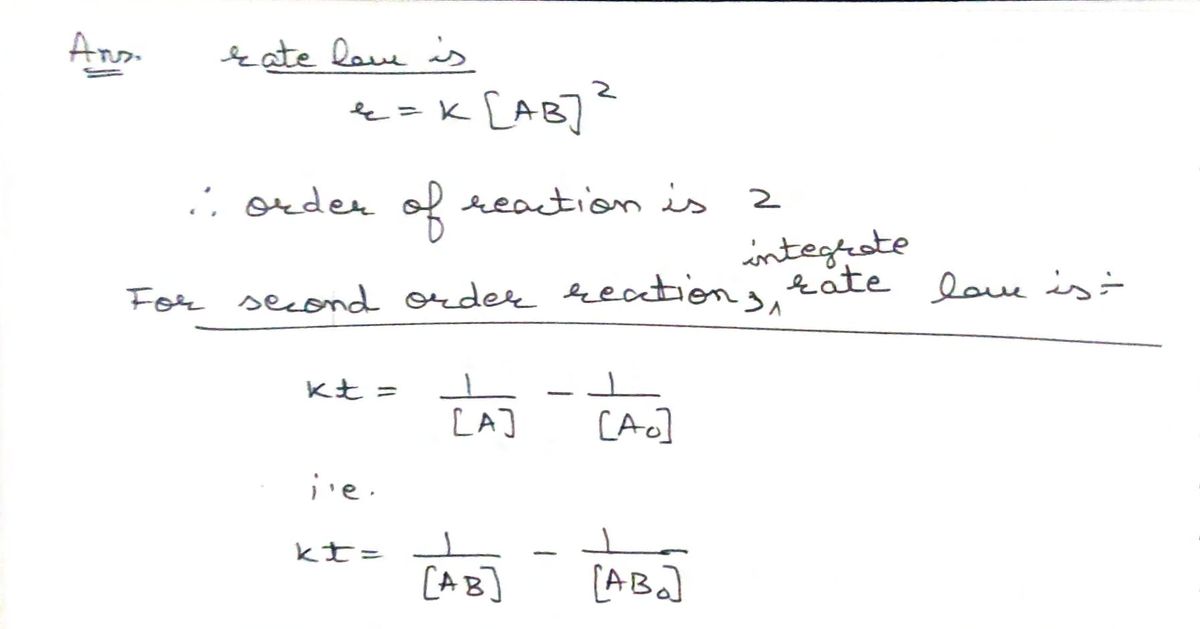For the fictitious reaction: AB → A + B Some data was collected measuring the [AB] at certain time intervals. This data was then graphed as described below. A graph of 1/[AB] versus time (s) gives a straight line with the equation: y = 0.0052x + 0.1135 and a R2 = 0.9995. A graph of ln[AB] versus time (s) gives a straight line with the equation: y = -0.0068x + 1.725 and a R2 = 0.8925. Assume the data doesn't fit a zero order reaction. The rate law is: Rate = k[AB]2 Find: What is the value of the rate constant for the given reaction? Select one: a. k = 0.0157 Ms-1 b. k = 0.0052 M-1s-1 c. k = 0.0068 s-1 d. There is no way to determine the value of the rate constant from the given information.
For the fictitious reaction: AB → A + B Some data was collected measuring the [AB] at certain time intervals. This data was then graphed as described below. A graph of 1/[AB] versus time (s) gives a straight line with the equation: y = 0.0052x + 0.1135 and a R2 = 0.9995. A graph of ln[AB] versus time (s) gives a straight line with the equation: y = -0.0068x + 1.725 and a R2 = 0.8925. Assume the data doesn't fit a zero order reaction. The rate law is: Rate = k[AB]2 Find: What is the value of the rate constant for the given reaction? Select one: a. k = 0.0157 Ms-1 b. k = 0.0052 M-1s-1 c. k = 0.0068 s-1 d. There is no way to determine the value of the rate constant from the given information.
Chemistry
10th Edition
ISBN:9781305957404
Author:Steven S. Zumdahl, Susan A. Zumdahl, Donald J. DeCoste
Publisher:Steven S. Zumdahl, Susan A. Zumdahl, Donald J. DeCoste
Chapter1: Chemical Foundations
Section: Chapter Questions
Problem 1RQ: Define and explain the differences between the following terms. a. law and theory b. theory and...
Related questions
Question
For the fictitious reaction: AB → A + B
Some data was collected measuring the [AB] at certain time intervals. This data was then graphed as described below.
A graph of 1/[AB] versus time (s) gives a straight line with the equation: y = 0.0052x + 0.1135 and a R2 = 0.9995. A graph of ln[AB] versus time (s) gives a straight line with the equation: y = -0.0068x + 1.725 and a R2 = 0.8925. Assume the data doesn't fit a zero order reaction.
The rate law is: Rate = k[AB]2
Find:
What is the value of the rate constant for the given reaction?
Select one:
a. k = 0.0157 Ms-1
b. k = 0.0052 M-1s-1
c. k = 0.0068 s-1
d. There is no way to determine the value of the rate constant from the given information.
Expert Solution
Step 1

Trending now
This is a popular solution!
Step by step
Solved in 2 steps with 2 images

Knowledge Booster
Learn more about
Need a deep-dive on the concept behind this application? Look no further. Learn more about this topic, chemistry and related others by exploring similar questions and additional content below.Recommended textbooks for you

Chemistry
Chemistry
ISBN:
9781305957404
Author:
Steven S. Zumdahl, Susan A. Zumdahl, Donald J. DeCoste
Publisher:
Cengage Learning

Chemistry
Chemistry
ISBN:
9781259911156
Author:
Raymond Chang Dr., Jason Overby Professor
Publisher:
McGraw-Hill Education

Principles of Instrumental Analysis
Chemistry
ISBN:
9781305577213
Author:
Douglas A. Skoog, F. James Holler, Stanley R. Crouch
Publisher:
Cengage Learning

Chemistry
Chemistry
ISBN:
9781305957404
Author:
Steven S. Zumdahl, Susan A. Zumdahl, Donald J. DeCoste
Publisher:
Cengage Learning

Chemistry
Chemistry
ISBN:
9781259911156
Author:
Raymond Chang Dr., Jason Overby Professor
Publisher:
McGraw-Hill Education

Principles of Instrumental Analysis
Chemistry
ISBN:
9781305577213
Author:
Douglas A. Skoog, F. James Holler, Stanley R. Crouch
Publisher:
Cengage Learning

Organic Chemistry
Chemistry
ISBN:
9780078021558
Author:
Janice Gorzynski Smith Dr.
Publisher:
McGraw-Hill Education

Chemistry: Principles and Reactions
Chemistry
ISBN:
9781305079373
Author:
William L. Masterton, Cecile N. Hurley
Publisher:
Cengage Learning

Elementary Principles of Chemical Processes, Bind…
Chemistry
ISBN:
9781118431221
Author:
Richard M. Felder, Ronald W. Rousseau, Lisa G. Bullard
Publisher:
WILEY